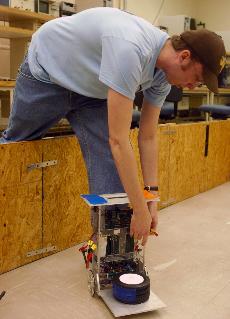Development of CAESAR shines spotlight on robots

Graduate student Chris Graunke adjusts a SegBot for a trial run in the CAESAR Laboratory Wednesday afternoon at the Transportation Building. Dan Hollander
Nov 9, 2006
Last updated on May 12, 2016 at 06:13 a.m.
The University has recently developed a new focus on robotics with CAESAR, the Center for Autonomous Engineering Systems and Robotics. It will coordinate faculty between engineering, mathematics, computer science departments and the Coordinated Science Laboratory.
“This came about from faculty wanting to centralize the robotics at the University,” said Steven LaValle, associate professor in Engineering. Robert Ghrist, associate professor in Mathematics, said that CAESAR will bring together people from all over campus who are interested in robotics. LaValle said that the CAESAR will be focused on three things: sensing, actuation and computation in robotics.
Ghrist said “one of the great things about Illinois is that we have really strong fields” that intersect in the interdisciplinary area of robotics, which is currently decentralized at the University, in order to gather “perspectives and resources.”
LaValle said that there are large robotics institutes at Carnegie Mellon, Georgia Tech and the Massachussets Institute of Technology.
Get The Daily Illini in your inbox!
Ghrist said that CAESAR will “bring ideas from math together with ideas from computer science in order to do some very bold work in robotics and sensor research.”
The whole that is greater than the sum of its parts is the interdisciplinary and synergistic activities of the group, Ghrist said. “There aren’t any robotic centers in the country involved with psychologists, mathematicians and computer scientists the way we do,” he added.
“Illinois’ style is not about grand challenges,” LaValle said. The University’s strength is in fundamental research, not the “quick bang for the buck.” CAESAR’s emphasis will be “proof of concept,” the theoretical grounding of robotic applications.
The University “can afford to go back to the basics,” he said.
“We want to change the way that people think about robotics by making fundamental discoveries,” LaValle said.
People are “inundated by an information overload,” LaValle said, adding that robots do not need a wealth of information to operate. He is concerned with the minimum amount of information a robot requires to operate, and cited the iRobot Roomba, which is a cleaning robot that can now be found in homes.
“People get excited about robotics,” LaValle said. CAESAR can help attract graduate students interested in robotics, he added, and allow undergraduate students to get more easily involved, especially in research.
Because robotics requires interdisciplanary research, LaValle said, it is important to get faculty together across departments in order to generate ideas, with things as simple as professors getting office space near one another, so that people can “bounce ideas off of one another.”
He said that CAESAR has already been organizing a lot of seminars and thus bringing in a lot of scholars from other campuses. CAESAR will help show these visitors the scholarship that the University has accrued in robotics. He said that these seminars give “more visibility to the outside world.”
CAESAR will enable scholars to “think in radical ways about what’s a robot,” he said.
There is a lot of “room for innovative ways” to approach robotics, Lavalle said. CAESAR will drill down to what a robot is in theory, Ghrist said.
“What you’ll find at Illinois is not people building robots that do cute or pony tricks that get them on CNN,” Ghrist said.
Robotics is “beyond engineering, into some very theoretical and very deep areas” Ghrist said.
Ghrist said that CAESAR will be an experiment concerning “what happens when you get a whole bunch of smart people in a room together with the common goal of making robotics happen,” and that “Illinois has the brains to make robots robust.”
“I, for one, welcome our robot overlords,” said Ghrist, referring to a Simpsons quote.





